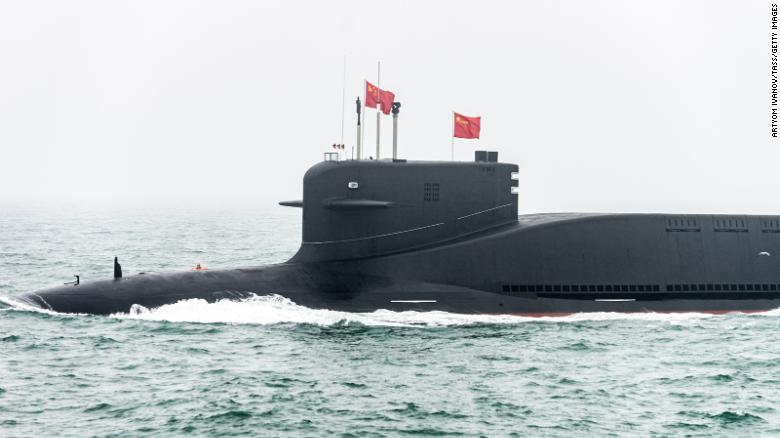Chinese submarine sailors report significant mental health problems in rare study

A Chinese ballistic missile submarine takes part in a military parade in the Yellow Sea in 2019.
Hong Kong (CNN)More than 1 in 5 sailors on Chinese submarines operating in the South China Sea reported mental health problems, according to a new study that provides a rare insight into the inner workings of one of the Chinese military's most guarded assets.
The research by China's Second Military Medical University
and Navy Military Medical University, published in the British journal
Military Medicine, showed submariners reported severe psychological
problems at much higher rates compared to People's Liberation Army (PLA)
forces as a whole.
"This
study demonstrates for the first time that soldiers and officers in the
submarine force in the South China Sea are facing mental health risks
and suffering from serious psychological problems," the researchers
concluded.
The
study surveyed 580 male submariners in the PLA Navy's South China Sea
fleet, with 511 of those returning complete responses. While the overall
condition of submariners' mental health was only slightly worse than
PLA troops in general, the research showed significantly worse problems
among the sub force in four areas.
PLA
Navy submariners showed higher rates of anxiety, phobias, paranoia and
somatization -- where mental issues surface with physical symptoms --
than among Chinese troops overall, the study found.
Conditions and the military situation in the South China Sea exacerbate the problems, the researchers said.
South China Sea conditions
The South China Sea has become a hotspot for military tensions in recent years.
Beijing
claims almost all of the 1.3 million square mile South China Sea, and
since 2014 it has built up tiny reefs and sandbars into man-made
artificial islands, fortified with missiles, runways and weapons systems
-- antagonizing regional governments with overlapping claims.
Washington doesn't recognize those claims and regularly sends US warships and military aircraft through the region.
China
in response has increased military maneuvers in the region, which means
submarines can spend two to three months submerged in tight, noisy
confines that lead to sleep deprivation among submariners, the
researchers said.
"The
physically unfriendly environment means that submariners are not only
living in an isolated, constantly closed environment, but they also
sleep in a cabin that is exposed to excessive noise," the study said.
Constant exposure to artificial light can also lead to mental problems, the researchers said.
The
researchers found submariners with college or post-graduate degrees
suffered more mental problems than those with lower levels of education.
They suggested two reasons for this: The highly educated have no way to
relieve psychological pressures in their isolated environment and long
for "freedom and integration into society."
The
researchers also said the problems were more pronounced among those on
nuclear-powered submarines versus those that were conventionally
powered. Not only do complex nuclear-powered submarines require better
educated personnel, those aboard them tend to worry more about accidents
and the effect of radiation on their health, the researchers said.
China's nuclear submarine plans
Although
the mental health of submariners has been explored in Western navies,
the researchers said few studies have been published from non-English
speaking countries.
They
said they hoped the study could be a baseline for China to monitor the
mental health of its submariners and suggested expanding the research to
the entire PLA Navy submarine fleet.
China
has a fleet of at least 60 submarines, according to a 2019 report from
the Washington-based Nuclear Threat Initiative (NTI). At least 10 of
those are nuclear-powered.
But
the country is in the midst of an ambitious shipbuilding program of
which submarines play an important part. The US Office of Naval
Intelligence expects the PLA Navy submarine force to increase by 16
nuclear-powered vessels in the next decade, according to a Congressional
Research Service report from March 2020.






No comments